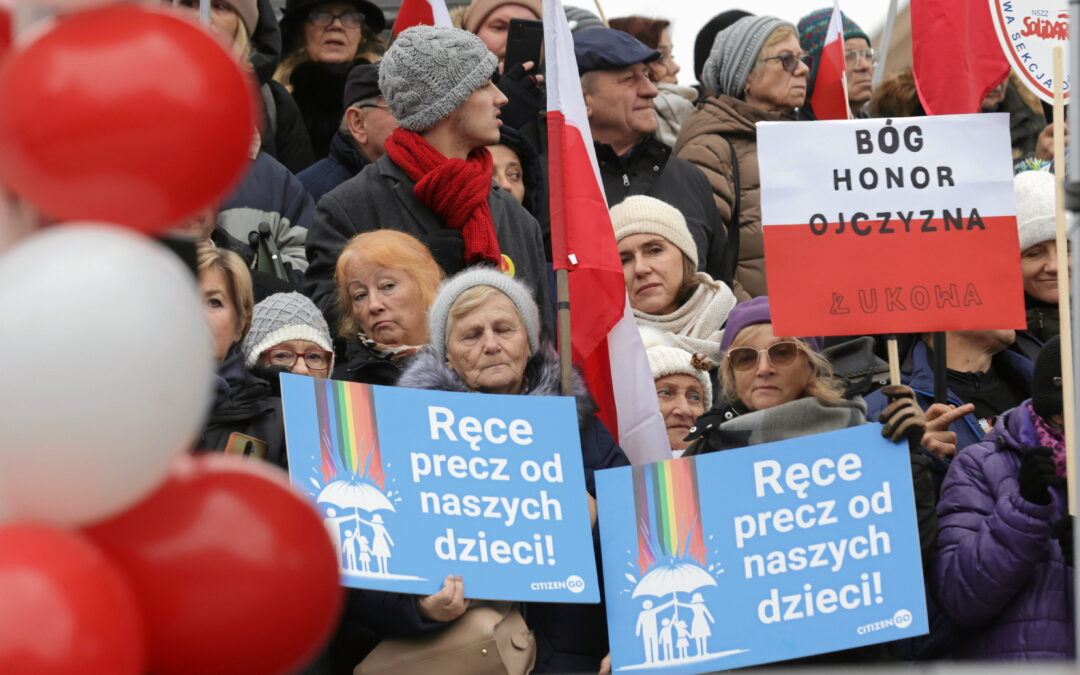Keep our news free from ads and paywalls by making a donation to support our work!

Notes from Poland is run by a small editorial team and is published by an independent, non-profit foundation that is funded through donations from our readers. We cannot do what we do without your support.
Leading figures from Poland’s national-conservative opposition Law and Justice (PiS) party joined a protest on Sunday against plans by the government to introduce a new subject, health education, in schools. They say that elements of the curriculum relating to sex education will cause “depravity” among children.
Among those to attend was Karol Nawrocki, who PiS a week earlier unveiled as the candidate they are supporting in next year’s presidential elections. He claimed that the new subject will “sexualise” children. The education ministry, however, denies such accusations.
Wielki protest "Tak – dla edukacji, nie – dla deprawacji" 💪🏼🇵🇱.#StawkąJestPolska pic.twitter.com/PnXsk9MkLf
— Przemysław Czarnek (@CzarnekP) December 1, 2024
In April, the ministers of education, health and sport announced plans to introduce health education as a compulsory subject for all year groups, replacing an existing class called education for family life (wychowanie do życia w rodzinie, or WDŻ, in Polish).
At the end of October, the education ministry published draft regulations on introducing the new subject from the start of the 2025/26 school year. It then held public consultations on the documents, which lasted until 21 November.
During that period, a number of conservative groups and commentators raised concern over the new subject, which defines “health as a value that should be cared for in its physical, mental, sexual, social and environmental dimensions”.
The draft regulations published by the ministry include elements relating to sex education, including topics such as “autosexual behaviour” and “the concept of psychosexual orientation (heterosexual, homosexual, bisexual, asexual)…[and] gender identity, cisgender, transgender”.
It also “discusses the criteria for informed consent” and “the elements of mature and conscious preparation for sexual initiation”.
Up until now, there have been elements of sex education in WDŻ, but their teaching is inconsistent – dependent upon the teacher – and the subject is optional.
Sex education has become a political battleground amid Poland's election campaign.
We spoke to students and teachers about how the subject is taught in Polish schools, and to activists leading the debate over the current pro-abstinence curriculum https://t.co/uqiRgxrIkh
— Notes from Poland 🇵🇱 (@notesfrompoland) July 19, 2023
Among those to express opposition to the proposed new subject was the Polish Bishops’ Conference (KEP), the central organ of the Catholic church in Poland, which said that health education violated Poland’s constitutional requirement to allow parents to raise their child in accordance with their convictions.
“Despite some legitimate topics, such as the potential dangers on the internet or the sharing of children’s images, the depraving provisions on sex education are unacceptable…[and] threaten the proper development of children,” wrote the KEP.
In response, education minister Barbara Nowacka denied that the subject contravened the constitution. She told the Polish Press Agency (PAP) that the teaching of health must include sexual health, which cannot be treated as a “taboo, special, separate subject”.
Szefowa #MEN odniosła się do głosu biskupów https://t.co/upVLec5tRt #BarbaraNowacka #KEP #Warszawa pic.twitter.com/YnL8eSaYSm
— Dzieje.pl (@dziejepl) November 22, 2024
On Sunday, opponents of the subject gathered in Warsaw for a protest under the slogan “Yes to education, no to depravity”.
Many banners displayed anti-LGBT slogans and images. Conservative groups in Poland have in recent years claimed that “LGBT ideology” is associated with attempts to “sexualise children”.
One banner declared that “Gays James Rennie and Neil Strachan [two convicted Scottish paedophiles] repeatedly raped a year-old child”. Another said “Stop the sexualisation of children in schools” alongside an image of an umbrella protecting a family from an LGBT+ rainbow.
TAK dla edukacji 🇵🇱
NIIE dla deprawacji 🏳️🌈Walczymy o wolną szkołę ✌️ pic.twitter.com/xBvyqUTDX4
— Joanna (@lenaris1969) December 1, 2024
While the protest was not organised by any political party, a number of senior figures from PiS attended, including Przemysław Czarnek, who served as education minister from 2020-2023. During his time in office he led a crusade against sex education, which he called “brainwashing”.
“We agree to health education, which is already in our core curriculum,” said Czarnek, quoted by news website wPolityce, “but not to this component [sex education], which is really depravity, an absolute abomination.”
Nawrocki, likewise, said that he supports the idea of health education but believes that elements relating to sex education should be “talked about in families”. He said the government’s plans for the subject are “a clear violation of the constitution”.
Dr @NawrockiKn w rozmowie z @TV_Trwam podczas manifestacji "Tak dla edukacji, nie dla deprawacji": Jestem tutaj przede wszystkim jako ojciec trójki dzieci. (…) Odbieranie rodzicom możliwości wpływania na edukację jest czymś, co budzi mój naturalny protest pic.twitter.com/Ezu30SZUue
— Radio Maryja (@RadioMaryja) December 1, 2024
Last week, the academic who led the team responsible for creating the core curriculum for health education, Zbigniew Izdebski, defended their work from conservative criticism. He argued that, rather than “sexualising” children, providing them with proper sex education has the opposite effect.
“Research shows that good knowledge can be a factor in delaying sexual initiation,” Izdebski told news website Interia. “If we as a society expect responsible decisions from young people, then we should also feel responsible for ensuring that they have knowledge on this subject.”

Notes from Poland is run by a small editorial team and published by an independent, non-profit foundation that is funded through donations from our readers. We cannot do what we do without your support.
Main image credit: Kuba Atys / Agencja Wyborcza.pl

Daniel Tilles is editor-in-chief of Notes from Poland. He has written on Polish affairs for a wide range of publications, including Foreign Policy, POLITICO Europe, EUobserver and Dziennik Gazeta Prawna.



















